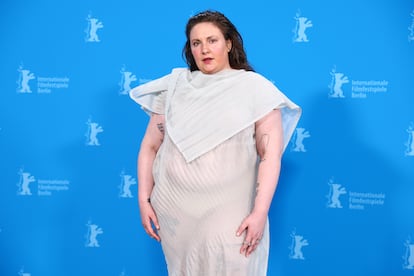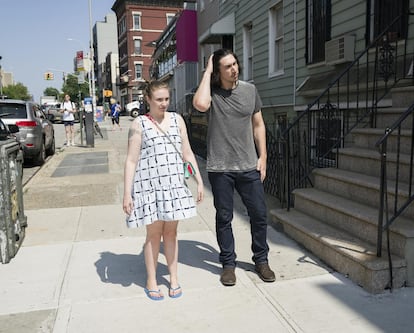Surviving ‘Girls’: After her rise and fall, Lena Dunham is back with a film about the Holocaust
Seven years after the finale of her polemic series, the actress-director explores her Polish Jewish roots in ‘Treasure,’ which was presented at the Berlinale

It is not the first time that Lena Dunham (New York, 37 years old) has traveled to Poland. At the beginning of her twenties, the actress-director flew to the lands of her ancestors with her college friends. “We spent the trip drinking vodka, going out with boys and dancing in clubs,” she remembered on Saturday during an interview in her hotel in Berlin. At the time, she wasn’t much interested in learning about her roots, which are Jewish-Polish on her mother’s side and saw “a significant number of lives lost in the area” during World War II. Her mother and grandmother told her that there wasn’t much point in going to Auschwitz: “It’s not a tourist site, what are you going to do there? In my family, there was no interest in understanding or committing, only in assimilating, in being Americans first and Jews after. I didn’t realize until we were getting close how scared I was.”
The last quote is a reference to the filming of Treasure, which was screened out of competition at the Berlinale, just outside the concentration camp. Directed by the German auteur Julia von Heinz, the film adapts a book by Lily Brett, a New York music journalist and daughter of Holocaust survivors, who traveled to post-Communist Poland in 1991 with her father to understand where he had come from. They found the familial home in Lodz, bought back the family’s porcelain crockery and her grandfather’s old coat from their then-current owners and got lost on desolate roads that took them to towns that “once were beautiful,” in a tragicomic journey that, on the big screen, Dunham takes with her disastrous and endearing father, played by Stephen Fry.
Through this reconciliation with her origins, an antidote to the amnesia of the New World, the character’s identity crisis is resolved. Was Dunham’s? “I made it my mission, something important to leave to our children. I had a feeling, I didn’t know where it came from, that there was something I needed to explore. I think I came back quite changed. It gave me a better understanding of the people I’m descended from. We think that when something like this happens, we’ll receive incredible and grandiose signs, when in fact, everything can happen in a gradual and orderly way. The zone of interest reflects very well how banal evil can be.”
The actress played the lead role in, and produced, the film — unfortunately she doesn’t direct or write the script, which might have worked in its favor — a commitment to the material that underlines what might be a change in her relationship with faith and culture. “When I was little, religion was a cultural thing, a kind of family obligation. When my grandmother Dorothy died in 2016, at the age of 96, I started studying with a rabbi, reading religious texts, and authors like Yehuda Amichai,” she remembers. “What I like about being Jewish is that it’s not mandatory to have a relationship with God, but rather, with the community around you. For me, being Jewish is about being someone you can trust, being a source of support, being able to recommend a good doctor or a beautician or being the person who shows up with bagels in an emergency situation.” The concept is called being a mensch, a good person, although Dunham acknowledges that sometimes she can also be a meshugana, or crazy person.
Dunham never really left, but it all feels a lot like a comeback. It’s been seven years since the finale of Girls, the series that established her as a television prodigy, the voice of a generation, a multiple Golden Globe winner, a Vogue cover girl, regularly featured in The New Yorker and the author of a book for which she received a $3.5 million advance. She also became a consistent flashpoint for controversy and scrutiny on social media, which was then in its embryonic phase. Topics of interest: her excessive nudity, her non-normative body, her alleged racism, her unbridled narcissism, anything that came out of her mouth.

When the series ended, she found herself mired in several public relations crises, which perhaps explains the presence of four publicists in the room in which the interview takes place. She called a woman a liar who had accused her co-screenwriter of rape, thus placing herself in opposition to the #MeToo movement after once having been one of its most vocal proponents. She was accused of treating a Black athlete offensively. She had to hire bodyguards when she received death threats (one of which came accompanied by a floor plan of her home, which showed where her bedroom was located). At the 2017 Met Gala, she collapsed and was admitted to a hospital. She underwent five surgeries to treat her endometriosis. She had a hysterectomy. She broke up with her partner, music producer Jack Antonoff. She was admitted to a detox clinic for her addiction to anxiolytics. And possibly the worst of all: her humor, the feminine version of that of her mentor Judd Apatow, the standard-bearer for the kind of comedians who would prefer to lose a close friend than be left to swallow a juicy one-liner, was no longer funny.
Return to television
Since then, Dunham has directed two low-profile films (one of them being Birdy, an adaptation of her favorite book from childhood), in addition to the series Camping, which was canceled by HBO after just one season, and a few episodes of Industry, which follows rookie investment bankers in London. If you compare that with the trajectory of Adam Driver, an actor that she made a star thanks to Girls, it seems a bit disappointing. “I was very young. I’m about to turn 38, and I was 23 when I wrote the pilot for the series that defined my entire twenties. We weren’t number one in viewers, but we certainly generated a lot of conversation. But, of course, it can’t always be like that… Back then, there was only a couple of series a week. Now, there’s 800 a year,” she says.
Her parents, the painter Carrol Dunham and photographer Laurie Simmons, warned her: “If you want to make a living from this, you’re going to go up and go down. You have to do it for the work itself, for the experience of making the work, and never for the response to the work.” That’s how she wants to work from now on. “My secret driving force is not success or how other people see me or winning a Golden Globe. Literally, I don’t know where my Golden Globes are.” Her next projects will be a movie inspired by Polly Pocket for Mattel, in the wake of Barbie’s mega-success, and a new comedy for Netflix that she’s currently shooting in London. “I’m not expecting a response on the scale of Girls, but it has reminded me how much I love making television.”
In recent years, viewers of all ages are once again watching Girls. And, this time, they’re feeling a sympathy for its characters that wasn’t there before: they no longer see Hannah, Marnie, Jessa and Shoshanna as four insufferable, egocentric brats, but perhaps, as people they know who resemble the foursome. For some time now, social media has been filled with gifs, memes and videos of the series’ best scenes. “I have no explanation for it, but I thank the TikTok algorithm,” says Dunham. “When the series began, people felt more empathy for a gangster like Tony Soprano than for these girls who had inappropriate sexual encounters. That it continues to resonate seems really special to me.” Would she call it ahead of its time? “That’s a bit precious to say about yourself,” she smiles. “What I’ll say is that nowadays, our culture has another understanding of what it means to not be a white, cisgender, heterosexual male.”
Dunham has not gone back to watch Girls, though from time to time someone will send her a supercut with a song by Taylor Swift or Phoebe Bridgers in the background, and she admits she’ll take a look. “And suddenly, I’ll say to myself: ‘You know what? That was fun’. I like that, in this new world, the things you do as an artist, even when they garner a complex response at first, wind up finding an audience that needs them and is able to bring them back,” she says. “Even if, sometimes, that can take a little bit of time.”
Sign up for our weekly newsletter to get more English-language news coverage from EL PAÍS USA Edition
Tu suscripción se está usando en otro dispositivo
¿Quieres añadir otro usuario a tu suscripción?
Si continúas leyendo en este dispositivo, no se podrá leer en el otro.
FlechaTu suscripción se está usando en otro dispositivo y solo puedes acceder a EL PAÍS desde un dispositivo a la vez.
Si quieres compartir tu cuenta, cambia tu suscripción a la modalidad Premium, así podrás añadir otro usuario. Cada uno accederá con su propia cuenta de email, lo que os permitirá personalizar vuestra experiencia en EL PAÍS.
¿Tienes una suscripción de empresa? Accede aquí para contratar más cuentas.
En el caso de no saber quién está usando tu cuenta, te recomendamos cambiar tu contraseña aquí.
Si decides continuar compartiendo tu cuenta, este mensaje se mostrará en tu dispositivo y en el de la otra persona que está usando tu cuenta de forma indefinida, afectando a tu experiencia de lectura. Puedes consultar aquí los términos y condiciones de la suscripción digital.









































